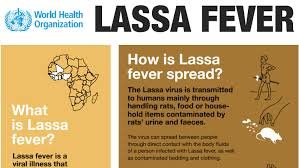As nineteen states in Nigeria recorded cases of Lassa fever, the Lagos State Commissioner for Health, Prof. Akin Abayomi has stressed the need for members of the public to ensure and maintain adequate personal hygiene and environmental sanitation at all times.
He described sanitation as part of prevention and control measures against the spread of the Lassa fever in the state.
Abayomi, who gave the charge, also confirmed that the state had recorded a case of the Lassa Hemorrhagic fever, which has been reported to be raging in over 19 states in the country, he further confirmed that the patient had been taken to the Lagos University Teaching Hospital.
Lassa Fever
Abayomi, while noting that the situation is under control, called on residents to be calm and not panic.
He assured the residents that state government, in collaboration with the Federal Ministry of Health and the Nigeria Centre for Disease Control, was doing everything possible to control the spread of the disease in the state.

He said, “The Ministry of Health through Epidemiology, Biosecurity and Global Health Directorate is currently carrying out ‘contact tracing’ to determine those who may have been infected in line with international standards while we beef up our other surveillance strategies.”
Abayomi noted that the prevention and control of the disease remained a shared responsibility of all citizens through the observance of the highest possible standards of personal and community hygiene as well as environmental sanitation.
He urged residents to store house-hold refuse in sanitary refuse bags or dust bins with tight-fitting covers to avoid infestation by rats and rodents; dispose of refuse properly at designated dump sites and not into the drainage system and store food items in rodent-proof containers.
The Commissioner also advised health workers, both in the public and private hospitals in the state, to ensure that they observe universal safety precautions.
He also urged them to comply with infection prevention and control measures when dealing with patients, stressing that appropriate personal protective equipment like hand gloves, facemasks, goggles, and overalls must be worn when attending to cases.
He stated that a case of Lassa Fever should be suspected in any person with persistent high fever, not responding to standard treatment for malaria and typhoid fever or bleeding from the body surface.

